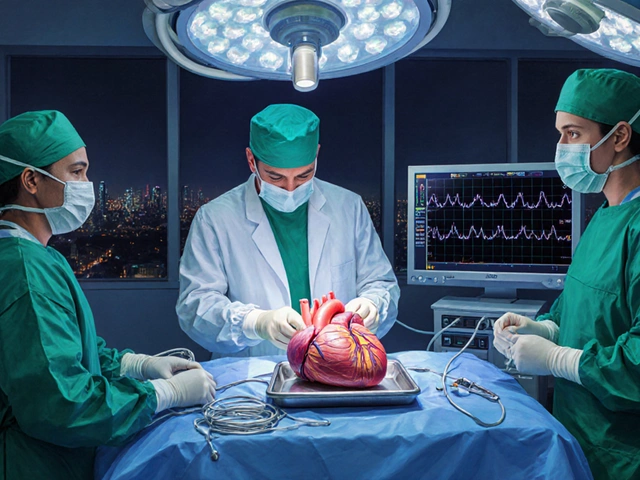Cancer is scary, and quite honestly, it can feel even more daunting when you hear about cancers that progress rapidly. Understanding which types kill fastest can provide a clearer picture of why early detection is so crucial. So, which cancers are considered the most aggressive?
Unfortunately, pancreatic cancer often tops the list. It's notorious for being sneaky, with symptoms not showing until it's advanced. That's why it’s crucial to stay informed and get checked if there's a family history. The survival rates are low partly due to late detection.
Another fast-moving type is liver cancer. It's aggressive and grows quickly, making it a top concern for health professionals. Knowing the risk factors, like hepatitis infections and alcohol abuse, can help you take preventative actions.
- Understanding Cancer Mortality
- Types of Fast-Killing Cancers
- Why Early Detection Matters
- Modern Advances in Treatment
- How Lifestyle Affects Cancer Progression
- Tips for Early Diagnosis
Understanding Cancer Mortality
So, what makes some cancer types so lethal? Mortality rates depend on multiple factors, including how quickly the cancer grows, its ability to spread, and the availability of effective treatments. Knowing this stuff can help in battling the big C and improving survival odds.
The Role of Early Detection
The faster a fast-killing cancer gets diagnosed, the better the chances of surviving it. Why? Time is of the essence. Early detection often leads to early treatment, which can significantly increase the survival rate. This is why regular screenings and awareness of symptoms are super important.
Aggressiveness vs. Treatment Options
Cancers like liver and pancreatic are aggressive, often showing symptoms only when they're already advanced. This delays treatment. Additionally, some of these cancers are resistant to conventional treatments like chemotherapy or radiation, making them even harder to tackle.
Influence of Lifestyle and Genetics
Risk factors aren’t just liver deep—lifestyle choices and genetics play a massive role. Smoking, heavy alcohol use, and a lack of physical activity can significantly increase risk. Meanwhile, a family history of certain cancers might mean you inherit a higher risk level yourself.
Understanding Numbers
| Cancer Type | Five-Year Survival Rate |
|---|---|
| Pancreatic | ~10% |
| Liver | ~20% |
Numbers tell a story of urgency. Pancreatic cancer has a low five-year survival rate of around 10%, largely due to late detection. Liver cancer's not much better, with only about 20%. Understanding these figures helps emphasize the need for rapid response to symptoms.
Types of Fast-Killing Cancers
When it comes to fast-killing cancer, there are a few types you really need to know about. Understanding these aggressive cancers can help you focus on early detection and prevention. Let's dive into the specifics.
Pancreatic Cancer
Starting with pancreatic cancer, this type is particularly notorious. It tends to be diagnosed late since symptoms like jaundice or abdominal pain often don’t appear until it’s advanced. Most patients are diagnosed when surgery is no longer an option. Due to its nature, the five-year survival rate is less than 10%. Keeping an eye on family history and managing conditions like diabetes can play a role in early detection.
Liver Cancer
Liver cancer is another one that progresses swiftly. If you’ve got risk factors such as hepatitis infections or chronic alcohol consumption, you really need to stay vigilant. Symptoms, including weight loss or yellowing of the skin and eyes, often pop up when the cancer is in its latter stages. Early liver cancer might be treated with surgery, but late-stage often needs more aggressive treatment options.
Lung Cancer
Lung cancer comes in as one of the leading causes of cancer deaths worldwide, partially because it’s often diagnosed at later stages. Non-smokers aren’t off the hook as air pollution and secondhand smoke are significant contributors too. Routine check-ups can help here, especially if you're or have been a smoker.
Esophageal Cancer
This one might surprise you. Esophageal cancer is aggressive and fast-spreading. Symptoms can be deceptive, like having difficulty swallowing or unexpected weight loss, but they're crucial to watch out for. It's more common in people over 50, especially men. So, keeping an eye on persistent symptoms is key.
Stomach Cancer
Lastly, stomach cancer. Like its counterparts, it's often caught later than desired. It's tied to an infection known as H. pylori. Regular screening becomes critical if you’re dealing with gastrointestinal issues.
The silver lining? While these cancers may sound daunting, knowing what to watch out for and taking charge of your health can make a huge difference. Early diagnosis is your best ally.
Why Early Detection Matters
So, let's talk straight: catching cancer early can make a world of difference. It sounds simple, but it's the key to fighting some of the most aggressive types of cancer before they spread.
The Importance of Timing
The clock starts ticking fast with certain quick-progressing cancers like pancreatic and liver cancer. Early detection means finding that cancer before it pulls its nasty tricks on your body. It can give you more treatment options and a better shot at survival.
More Treatment Options
If you catch it early, docs have more ways to tackle it. From surgery to radiation, and sometimes just keeping an eye on things. Waiting until symptoms show often narrows these options.
Better Survival Rates
Statistically, early detection improves cancer survival rates. For example, when breast cancer is found early, the 5-year survival rate is 99% compared to a much lower percentage when found later.
How to Take Action
- Don't skip those routine checkups. Regular screenings can spot potential issues before they become big problems.
- Pay attention to changes in your body. It might be tempting to shrug off little aches or unusual symptoms, but those could be signs.
- Know your family's history. Some types of cancer have a hereditary link, so knowing your risk can guide your screening schedule.
The bottom line? Act early, get informed, and don't wait for symptoms to show up. Timing really is everything in the fight against fast-killing cancer.

Modern Advances in Treatment
The world of cancer treatment has changed a lot, thanks to modern technology and research. There's some real hope now, especially with the progress we've made in tackling fast-killing cancer.
Immunotherapy
One of the biggest buzzwords in cancer treatment today is immunotherapy. It's all about using the body's own immune system to fight cancer. Imagine that—your body is like a defense squad, going after these pesky cancer cells. For cancers like melanoma and lung cancer, this approach is showing some promising results.
Precision Medicine
Precision medicine is the new kid on the block. It focuses on genetic changes in the cancer cells rather than where the cancer started. This means doctors can provide treatments tailored specifically to the patient's genetic makeup, increasing the chances of efficacy while minimizing side effects.
Targeted Therapy
This one's been around but has evolved. Targeted therapy uses drugs or other substances to precisely identify and attack cancer cells, sparing the normal cells. It's especially effective for breast and colorectal cancers.
Here's a little table showing improvements in survival rates thanks to these treatments:
| Cancer Type | Improvement in Survival Rates (%) |
|---|---|
| Melanoma | 15% |
| Lung Cancer | 10% |
| Colorectal Cancer | 12% |
Advanced Surgical Techniques
Surgery is not what it used to be. Minimally invasive surgeries mean less recovery time and more precision. Techniques like laparoscopic surgery enable doctors to remove tumors with tiny incisions, which is a huge win in the cancer treatment world.
AI and Big Data
Believe it or not, AI is now having a seat at the oncology table. It's getting pretty good at predicting outcomes and even suggesting treatment plans. By analyzing vast amounts of data, AI helps doctors make more informed decisions.
These advancements mean hope for many patients and their families. As technology pushes forward, so do our chances of outsmarting cancer.
How Lifestyle Affects Cancer Progression
Ever wondered how the choices we make every day impact cancer progression? It turns out, lifestyle plays a huge role. The connection between lifestyle factors and cancer isn't a mystery anymore. With more research emerging, it's clear that certain habits might speed up or slow down the disease.
Diet's Role in Cancer
A nutrient-rich diet can be your best defense. Eating plenty of fruits, veggies, and whole grains is linked to a lower risk of developing fast-growing cancers like pancreatic and liver cancer. Avoiding processed foods and sugar can also make a big difference in managing your health.
"The health choices we make today can significantly influence the cancer burden we face tomorrow," says Dr. Karen Smith, oncologist at the National Cancer Institute.
Exercise and Cancer
Staying active is another powerful weapon. Regular physical activity helps maintain a healthy weight, reduces inflammation, and boosts your immune system, which is crucial for combating cancer progression. Aim for at least 150 minutes of moderate exercise a week. Simple activities like walking or biking are perfect.
Stress and Sleep
Managing stress and getting enough sleep might not just feel good—they're vital for your body’s ability to fight off illnesses, including cancer. Chronic stress can contribute to rapid cancer cell growth, while adequate sleep allows your body to recover and repair.
- Reduce stress through mindfulness or yoga.
- Aim for 7-9 hours of quality sleep each night.
Substance Use
Lastly, steering clear of tobacco and excessive alcohol is a no-brainer. Smoking is a known culprit for many types of cancer, while heavy drinking is linked to liver and pancreatic cancers. Quitting smoking and moderating alcohol intake can drastically lower your risk.
Tips for Early Diagnosis
Early diagnosis can make all the difference when it comes to fighting cancer. The earlier you catch it, the better your chances of successful treatment. So, what can you do to increase the odds of early detection?
Regular Screenings
Start with regular screenings. They're crucial in identifying fast-killing cancers before they reach advanced stages. Talk to your doctor about which screenings you need based on your age, family history, and risk factors. Mammograms, colonoscopies, and skin checks are just a few examples.
Know Your Family History
Your genes can tell you a lot. If certain types of cancer run in your family, inform your healthcare provider. Genetic testing might be something to think about, as it can provide insights into your personal risk.
Listen to Your Body
Be alert to changes in your body. Unexplained weight loss, persistent fatigue, unusual lumps, or changes in moles should never be ignored. These could be clues that something's off, and getting them checked sooner rather than later is wise.
Healthy Lifestyle Choices
While lifestyle change isn't a guarantee, it helps lower the risk. A healthy lifestyle, involving a balanced diet, regular exercise, and no smoking, has been linked to reduced cancer risks. Small daily decisions make a big difference.
Stay Informed
Knowledge is power. Keep yourself informed about the latest advancements in cancer treatment and early detection techniques. New methods and technology can offer more options than before, leading to better outcomes.
Staying proactive about your health could be the game-changer in the battle against cancer. Remember, with cancer, every minute counts, and early diagnosis is a key strategy in winning that race.



